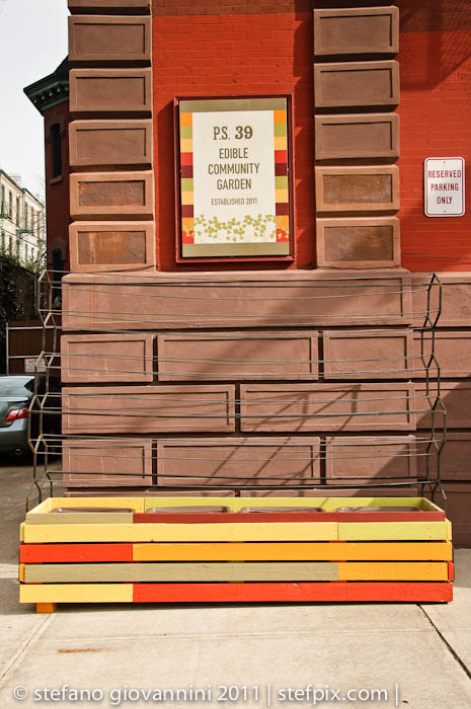The P.S. 39 Edible Community Garden
Park Slope . Brooklyn, NY

P.S. 39 The Henry Bristow Landmark School in
Park Slope, Brooklyn is thrilled to announce the launch of the P.S. 39 Edible Community Garden. This pilot program is an
edible micro-garden, showcasing modern planting methods appropriate for urban
challenges. The garden will be
integrated into the school’s curriculum, food program, and the surrounding
community. The goal of P.S. 39 ECG is to engage students in all
aspects of farm to fork activities from inception to harvest. We hope to inspire a curiosity and
understanding of where their food comes from, encourage healthy lifestyle
choices, and teach them in a hands-on way what it means to be environmental
stewards. The garden will be a catalyst for discovery and a means of
expanding their senses as they watch, smell, feel, and taste the fruits and
veggies of their labors.
By now, everyone knows there is a critical link between children’s health and nutrition. New York City is heeding the call by taking the lead on improving school food, and school gardens are another more hands-on solution. Yet, outside of several well publicized (and well funded) school garden initiatives, few examples exist that can quickly and affordably enable communities to tackle the problem right now.
Using pioneering sub-irrigated micro-garden planter technology ideal for urban environments, P.S. 39 ECG will show how a dedicated team of school staff, parents and community volunteers can come together and in less than six months build a showcase school garden that aims to become a replicable and inclusive model of urban micro-farming for schools, homes, and businesses across the country.
Our objective is for our students to adopt and take our garden program to practice at home with their families (true homework). This program will not only educate the students and families of the school, but enrich and outreach into the community.
A more accessible and environmentally friendly alternative to conventional gardens, sub-irrigated planter systems (SIPs), store water and oxygen below the potting mix and roots, conserving water and nutrients. The beneficial closed loop system dramatically increases yields. They also eliminate the need for costly materials by using readily available recycled containers such as shipping pallets and soda bottles, making them portable and easy to maintain. Above-ground planter systems are also ideal for urban lots with no open soil area or possibly contaminated soil, providing cost-effective solutions for communities with limited resources.
Curriculum-Enrichment
P.S. 39 ECG will build a garden-based learning curriculum where scientific principles come to life. This unique and innovative 21st century edible garden will engage students with hands-on learning experiences from seed to plate throughout the growing season. First through fifth grade classes will plant, maintain, study, harvest and savor edible plants through curriculum-tied activities and enrichment clusters. In the process, they will learn scientific principles like capillary action and Archimedes irrigation methods; composting in creating a closed-loop sustainable garden; learn about nutrient density and companion planting; discover the differences between pests and beneficial insects. Their findings--and food!--will be presented at the school-wide Enrichment Share Fair in Spring 2011.
A District-Wide Initiative
The P.S. 39 Edible Community Garden Pilot Program is an integral component of a larger district-wide movement to become a pilot district for wellness in the schools. Schools in Brooklyn’s District 15, together with support from Council members Brad Lander and Sara Gonzalez, a team of partners--principals, teachers, DOE School Food staff, students and parents--are implementing salad bars and healthier menus, growing food in school gardens, reducing styrofoam and waste, promoting breakfast-in-the-classroom, integrating food choices into the curriculum, and helping families learn to cook healthier meals. Within this existing framework, P.S. 39 ECG hopes to forge new paths in the broader school food movement by showing what is possible with limited time and resources and a place in the sun. So the next time the kids ask, “What’s for lunch today?” You can reply, “You tell me? What’s ripe!”
Hope for the future is at the heart of all gardening.
By now, everyone knows there is a critical link between children’s health and nutrition. New York City is heeding the call by taking the lead on improving school food, and school gardens are another more hands-on solution. Yet, outside of several well publicized (and well funded) school garden initiatives, few examples exist that can quickly and affordably enable communities to tackle the problem right now.
Using pioneering sub-irrigated micro-garden planter technology ideal for urban environments, P.S. 39 ECG will show how a dedicated team of school staff, parents and community volunteers can come together and in less than six months build a showcase school garden that aims to become a replicable and inclusive model of urban micro-farming for schools, homes, and businesses across the country.
Our objective is for our students to adopt and take our garden program to practice at home with their families (true homework). This program will not only educate the students and families of the school, but enrich and outreach into the community.
A more accessible and environmentally friendly alternative to conventional gardens, sub-irrigated planter systems (SIPs), store water and oxygen below the potting mix and roots, conserving water and nutrients. The beneficial closed loop system dramatically increases yields. They also eliminate the need for costly materials by using readily available recycled containers such as shipping pallets and soda bottles, making them portable and easy to maintain. Above-ground planter systems are also ideal for urban lots with no open soil area or possibly contaminated soil, providing cost-effective solutions for communities with limited resources.
Curriculum-Enrichment
P.S. 39 ECG will build a garden-based learning curriculum where scientific principles come to life. This unique and innovative 21st century edible garden will engage students with hands-on learning experiences from seed to plate throughout the growing season. First through fifth grade classes will plant, maintain, study, harvest and savor edible plants through curriculum-tied activities and enrichment clusters. In the process, they will learn scientific principles like capillary action and Archimedes irrigation methods; composting in creating a closed-loop sustainable garden; learn about nutrient density and companion planting; discover the differences between pests and beneficial insects. Their findings--and food!--will be presented at the school-wide Enrichment Share Fair in Spring 2011.
A District-Wide Initiative
The P.S. 39 Edible Community Garden Pilot Program is an integral component of a larger district-wide movement to become a pilot district for wellness in the schools. Schools in Brooklyn’s District 15, together with support from Council members Brad Lander and Sara Gonzalez, a team of partners--principals, teachers, DOE School Food staff, students and parents--are implementing salad bars and healthier menus, growing food in school gardens, reducing styrofoam and waste, promoting breakfast-in-the-classroom, integrating food choices into the curriculum, and helping families learn to cook healthier meals. Within this existing framework, P.S. 39 ECG hopes to forge new paths in the broader school food movement by showing what is possible with limited time and resources and a place in the sun. So the next time the kids ask, “What’s for lunch today?” You can reply, “You tell me? What’s ripe!”
Hope for the future is at the heart of all gardening.
Contributors and Participants
P.S. 39 Edible Community Garden Team:
Anita de Paz , P.S. 39 Principal Lidia Rosa , P.S. 39 Parent Coordinator Donna Baker , P.S. 39 Administrative Coordinator June Crane , P.S. 39 Science Teacher Susan Moesker , Melissa Williams, PTA Co-Presidents P.S. 39 Custodial Staff Frieda Lim , P.S. 39 ECG Project Co-Leader Trisha Mulligan, P.S. 39 ECG Project Co-Leader Jim Seger, Christine Seger, Kevin McClurkan, Project Architects Beth Franz, Landscape Architect Jo Goldfarb, Sabine Hrechdakian, PR Diana English, P.S.39 Graphics P.S. 39 Garden Committee: Aimee Martin, Alan Siege, Ali Bogner, Ana Martinez, Andrea Nye, Anita Concialdi, Anne Wiesen, Diana Racz, Emily Davis, Evan Shapiro, Felicia Patinkin, Gail Raheb, Gilly Costello, Greg Smithsimon, Heidi Johannsen Stewart, Jackie Roebuck, Janna Bastone, Jeanne McLellan, John Seitz, Lesli Klainberg, Marilyn Van Dunk, Mark Lorenzen, Melissa Williams, Miguel Gomez, Molleen Theodore, Nashwa Raffia-Savio, Susan Moesker, Taura McMeekin, Tony Garnier, Ulla Dalum Berg P.S. 39 ECG Product Donors: We would like to thank those have generously donated materials ADS Brooklyn Homebrew Dalen Products Inc Dubois Agrinovation Inc . Carousel of Beverages The Espoma Company Fairway Hot Pepper Wax Joe Leopoldi Hardware Co. Inc., 718.499.6563 Kinco International Lowe’s Real Food Campaign Seed Savers Exchange Silver Heights Farm and Nursery Serett Metalworks Soil Sleuth, The Ultimate Soil Probe Water Right Inc. |

